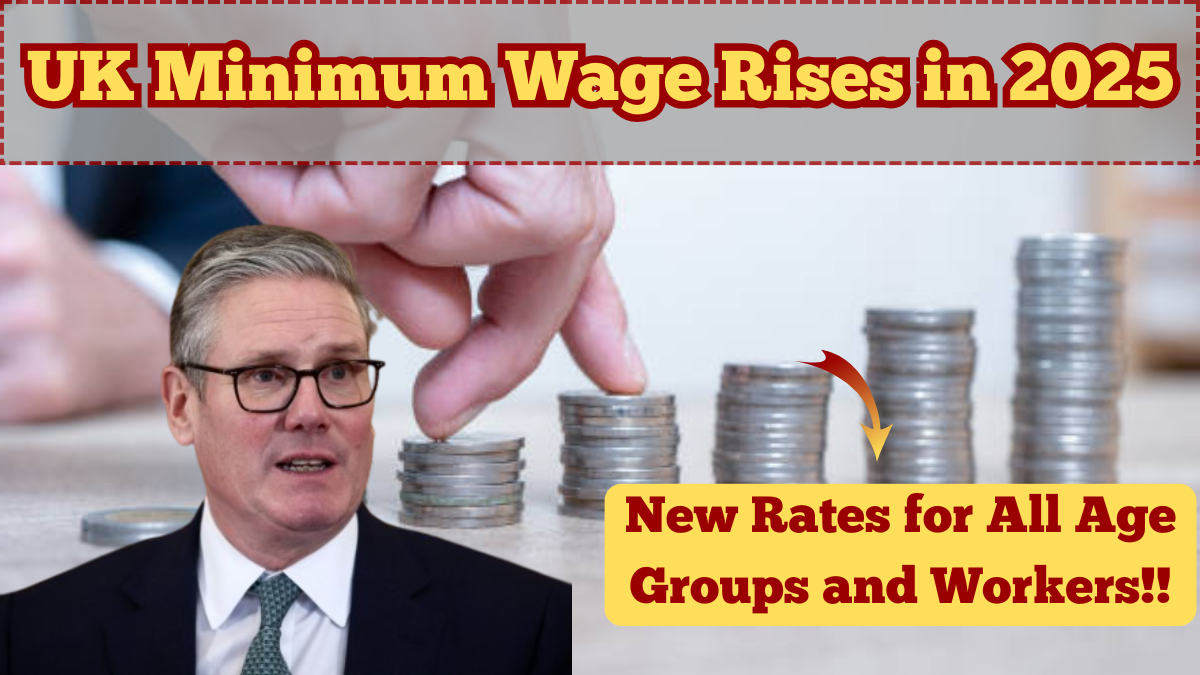In 2025, the UK is witnessing a significant increase in the minimum wage, benefiting millions of workers across the country. Whether you’re a young adult, a part-time worker, or employed full-time, the new national living wage rates will provide a much-needed pay boost.
The UK government has announced these changes as part of their ongoing commitment to ensure that workers are paid fairly for their work. With the cost of living continuing to rise, the pay rise UK aims to help workers cope with inflation and maintain a decent standard of living.
Here’s everything you need to know about the new minimum wage increase in 2025 and what it means for you.

What Are the New Minimum Wage Rates?
The UK government has set new hourly pay UK rates for various age groups and sectors. These rates are designed to help workers across the country earn a fair wage for their efforts. Here’s a breakdown of the 2025 pay rise UK for different categories:
-
National Living Wage (23 and over): £11.10 per hour (previously £10.90)
-
21-22 Year Olds: £9.40 per hour (previously £9.18)
-
18-20 Year Olds: £7.85 per hour (previously £7.49)
-
Under 18s: £5.30 per hour (previously £5.28)
-
Apprentices: £5.30 per hour (previously £5.28)
As you can see, the national living wage has seen a modest increase, with workers aged 23 and above receiving £11.10 per hour. For younger workers and apprentices, the rates have also been raised, ensuring that everyone, regardless of age, receives a fair wage.
Why Is the Minimum Wage Increasing in 2025?
The increase in the UK wage 2025 is part of the government’s effort to address the rising cost of living. The government has acknowledged that many workers, especially those in low-paid jobs, are struggling to make ends meet.
With inflation impacting everything from rent to food prices, the pay rise UK is designed to help low-income workers keep up with rising expenses. By raising the minimum wage, the UK government is aiming to reduce income inequality and ensure that everyone, regardless of their age or experience, is paid a fair wage for their work.
Additionally, this increase in the minimum wage helps support the economy by putting more money into the hands of people who are likely to spend it on goods and services, boosting overall demand in the economy.
Who Will Benefit from the Minimum Wage Increase?
The 2025 pay rise UK affects a wide range of workers. The increase in minimum wage rates will benefit the following groups:
-
Full-time workers: Individuals working full-time in low-paid jobs will see a significant increase in their earnings. This is particularly important for workers in sectors such as retail, hospitality, and care work.
-
Young workers: The pay rise will benefit younger workers who often face lower wages. For instance, workers aged 18 to 22 will see an increase in their hourly pay, helping them cover the cost of living.
-
Apprentices: Apprentices, who often earn lower wages while learning on the job, will see their pay rise in line with the increase in the national minimum wage.
The increase ensures that no matter what stage of their career or life a worker is in, they can rely on a fair wage to meet their needs.
What Does This Mean for Employers?
For employers, the UK wage 2025 increase means adjusting payroll systems to comply with the new minimum wage rates. Companies will need to ensure that all employees are paid at least the minimum wage according to their age and job classification.
Some employers may need to make adjustments to their hourly pay UK structures to comply with the new law. For businesses that employ many low-paid workers, this could represent an increase in labor costs. However, it’s important to note that the minimum wage increase aims to support economic stability by putting more money into the pockets of workers, who are likely to spend it on goods and services.
Will the Minimum Wage Increase in 2025 Be Enough?
While the UK minimum wage rise will help many workers, there are some concerns about whether it will be enough to cover the full impact of inflation and the rising cost of living. Critics argue that even with the increase, wages in certain sectors may still fall short of what’s needed to maintain a decent quality of life.
That said, the pay rise UK is a step in the right direction. The government has indicated that they will continue to review wage policies to ensure that workers are paid fairly and that income inequality is addressed.
What Should Workers Do to Ensure They’re Paid Correctly?
If you’re a worker in the UK, it’s important to be proactive and ensure you’re receiving the correct hourly pay UK according to the new minimum wage rates. Here’s how you can protect your rights:
-
Check your pay slip: Make sure that your employer is paying you the new minimum wage rate. If you are underpaid, you have the right to ask for the correct amount.
-
Understand your rights: Familiarize yourself with the new wage rates and the UK wage 2025 regulations to know what you’re entitled to.
-
Report underpayment: If your employer isn’t paying you the minimum wage, you can file a complaint with the HMRC.
Workers must stay informed about their rights to ensure that they’re receiving fair compensation for their work.
FAQs
How much will the UK minimum wage increase in 2025?
The UK minimum wage will rise to £11.10 per hour for workers aged 23 and over, with increases for other age groups as well.
Will all workers benefit from the pay rise UK?
Yes, all workers earning below the new thresholds, including those aged 18-22 and apprentices, will benefit from the pay rise UK in 2025.
Why is the minimum wage increase happening?
The increase is designed to help workers cope with rising costs of living and inflation, ensuring that workers are paid a fair wage for their labor.
How do I know if I’m getting paid the correct hourly pay UK?
Check your pay slip to ensure that you’re being paid according to the new minimum wage rates. If you’re unsure, you can contact your employer or report the issue to HMRC.
What can I do if I’m not paid the correct wage?
If you’re not paid the minimum wage, you can file a complaint with HMRC to ensure that you’re compensated fairly.
Click here to know more.
Aanchal is a passionate writer with a keen interest in storytelling, content creation, and creative expression. She enjoys exploring diverse topics and crafting engaging narratives that captivate readers.




